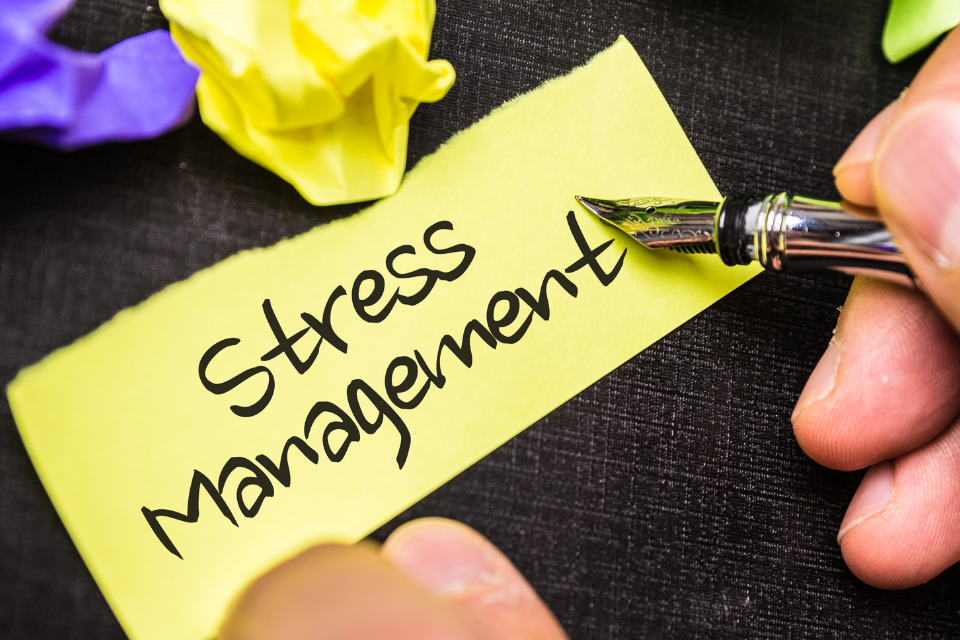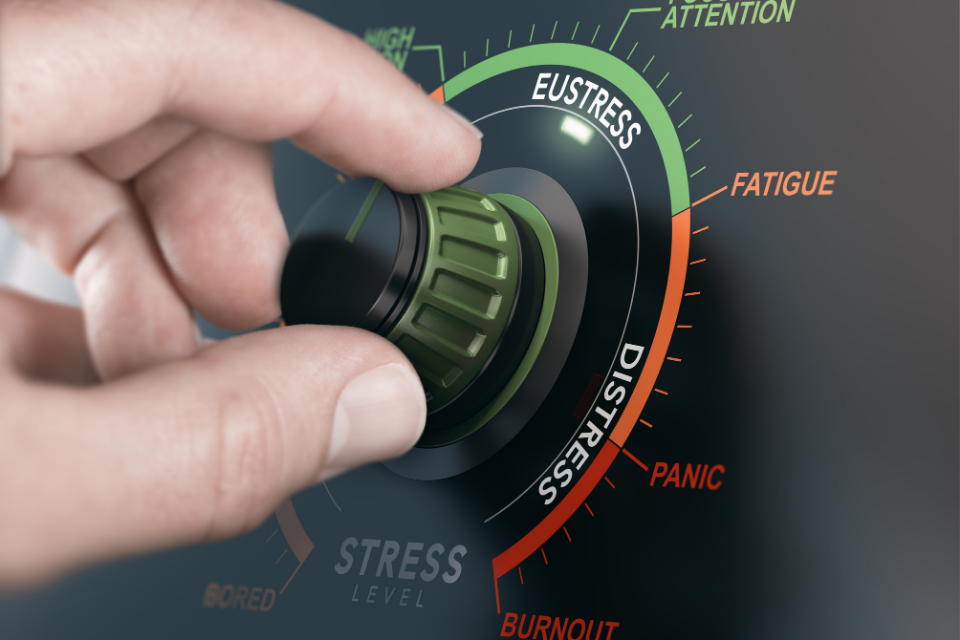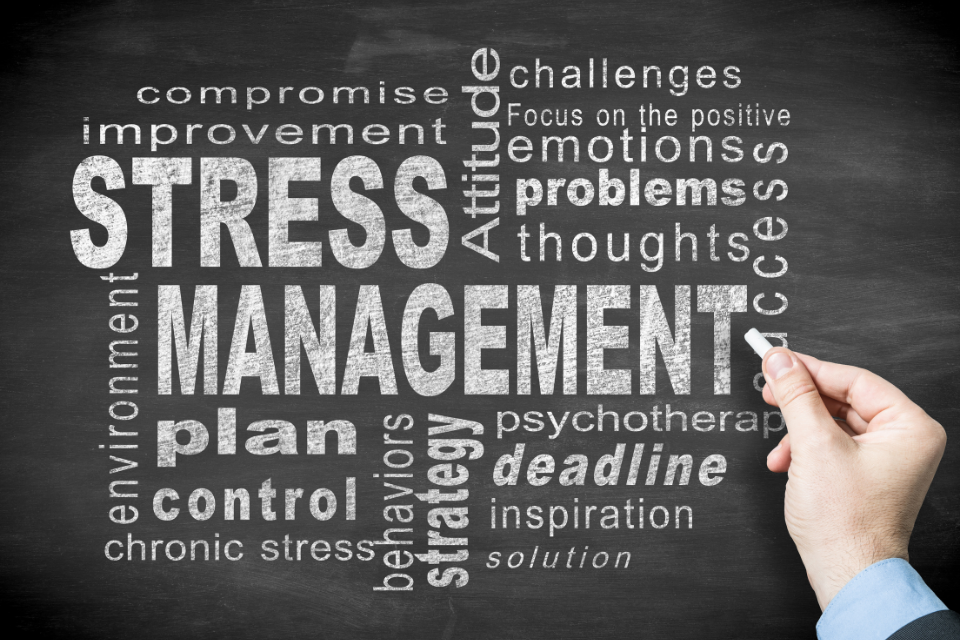Learn Stress Management

Stress!! – We all experience it in our lives. The vast majority of health problems are caused or influenced by stress. It is important to understand how stress affects your body and learn effective stress management techniques to make stress work for you rather than against you.
Effective stress management helps you break the hold stress has on your life, so you can be happier, healthier, and more productive. Managing stress is all about taking charge: taking charge of your emotions, your thoughts, your environment, your schedule, and the way you deal with problems. The ultimate goal is a balanced life, with time for work, relationships, relaxation, and fun – plus the resilience to hold up under pressure and meet challenges head on.

Positive Self-Talk
We talk to ourselves all the times. Sometimes we talk out loud but usually we do it in our heads. Self-talk can be positive or negative. Negative self-talk increases stress. Positive self-talk can help you calm down and control stress. With practice, you can learn to shift negative thoughts to positive ones.
For example:
Negative to Positive
I am always late – I reach on time always
I am not good at this – I will do the best I can
I can’t believe I messed it up – I am human, and we all make mistakes. I can fix it
Everything is going wrong – I can handle this, I need to take one step at a time
Make a note of the talk that happens in your mind and if it is negative then reverse it with positive talks. To really make it work, practice positive self-talk every day — in the car, at your desk, before you go to bed or whenever you notice negative thoughts. Teach it to kids, it will make wonders to them.
Emergency Stress busters


Emergency stress busters are actions to help you defuse stress in the moment. You may need different stress busters for different situations, and sometimes it helps to combine them. Some ideas:
- Count to 10 before you speak or react.
- Take a few slow, deep breaths until you feel your body un-clench a bit.
- Go for a walk, even if it’s a small walk. It can help break the tension and give you a chance to think things through.
- Try a quick meditation or prayer to get some perspective.
- If it’s not urgent, sleep on it and respond tomorrow. This works especially well for stressful emails and social media trolls.
- Walk away from the situation for a while and handle it later once things have calmed down.
- Break down big problems into smaller parts. Take one step at a time, instead of trying to tackle everything at once.
- Turn on some music or an inspirational podcast/video
- Spend some time with pet animal, talk to a loved one or close friend
- Work out or do something active. Exercise is a great antidote for stress.
Unhealthy ways of coping with stress


These coping strategies may temporarily reduce stress, but they cause more damage in the long run:
- Smoking
- Drinking alcohol
- Overeating or under eating
- Spending out time for hours in front of the TV or computer
- Withdrawing from friends, family, and activities
- Using pills or drugs to relax
- Sleeping too much
- Procrastinating
- Filling up every minute of the day to avoid facing problems
- Taking out your stress on others
Learning healthier ways to manage stress
If your methods of coping with stress aren’t contributing to your greater emotional and physical health, it’s time to find healthier ones. There are many healthy ways to manage and cope with stress, but they all require change. You can either change the situation or change your reaction.
Since everyone has a unique response to stress, there is no “one size fits all” solution to manage it. No single method works for everyone or in every situation, so experiment with different techniques and strategies. Focus on what makes you feel calm and in control.
#1: Avoid unnecessary stress
Not all stress can be avoided, and it’s not healthy to avoid a situation that needs to be addressed. You may be surprised, however, by the number of stressors in your life that you can eliminate.
- Learn how to say “no”
- Avoid people who stress you out
- Take control of your environment
- Avoid hot-button topics
- Pare down your to-do list
#2: Alter the situation
If you can’t avoid a stressful situation, try to alter it. Figure out what you can do to change things, so the problem doesn’t present itself in the future. Often, this involves changing the way you communicate and operate in your daily life.
- Express your feelings instead of bottling them up.
- Be willing to compromise.
- Be more assertive.
- Manage your time better.
#3: Adapt to the stressor
If you can’t change the stressor, change yourself. You can adapt to stressful situations and regain your sense of control by changing your expectations and attitude.
- Re-frame problems.
- Look at the big picture.
- Adjust your standards.
- Focus on the positive.
- Adjust Your Attitude
#4: Accept the things you can’t change
Some sources of stress are unavoidable. You can’t prevent or change stressors such as the death of a loved one, a serious illness, or a national recession. In such cases, the best way to cope with stress is to accept things as they are. Acceptance may be difficult, but in the long run, it’s easier than railing against a situation you can’t change.
- Don’t try to control the uncontrollable.
- Look for the upside.
- Share your feelings.
- Learn to forgive and forget.
#5: Make time for fun and relaxation
Beyond a take-charge approach and a positive attitude, you can reduce stress in your life by nurturing yourself. If you regularly make time for fun and relaxation, you’ll be in a better place to handle life’s stressors when they inevitably come.
Don’t get so caught up in the hustle and bustle of life that you forget to take care of your own needs. Nurturing yourself is a necessity, not a luxury.
- Set aside relaxation time.
- Connect with others.
- Do something you enjoy every day.
- Keep your sense of humour.
- Learn the relaxation response.
You can control your stress levels with relaxation techniques that evoke the body’s relaxation response, a state of restfulness that is the opposite of the stress response. Regularly practicing these techniques will build your physical and emotional resilience, heal your body, and boost your overall feelings of joy and equanimity.
#6: Adopt a healthy lifestyle
You can increase your resistance to stress by strengthening your physical health.
- Exercise regularly.
- Eat a healthy diet.
- Reduce caffeine and sugar.
- Avoid alcohol, cigarettes, and drugs.
- Get enough sleep. Adequate sleep fuels your mind, as well as your body.














4 comments
katalog firm
December 12, 2021 at 8:20 pm
Hey There. I found your blog better than the usage of google/msn. That is an extremely neatly written article.
I will be sure to bookmark it and come back to read more of your useful info. Thank you for the post.
I will certainly comeback.
torri.dreher
June 16, 2022 at 3:51 am
I’ve been surfing on-line greater than three hours today, but I by no means found any interesting article like yours.
It is pretty value sufficient for me. Personally, if all web owners and bloggers made excellent content as you did, the net might be a lot more useful than ever before.
Twicsy
July 11, 2022 at 9:01 pm
Hi everyone, it’s my first visit at this site, and article is really fruitful
for me, keep up posting such articles or reviews.
Anita Desai
August 2, 2022 at 6:06 am
This is a topic which is near to my heart…
Thank you! Exactly where are your contact details
though?